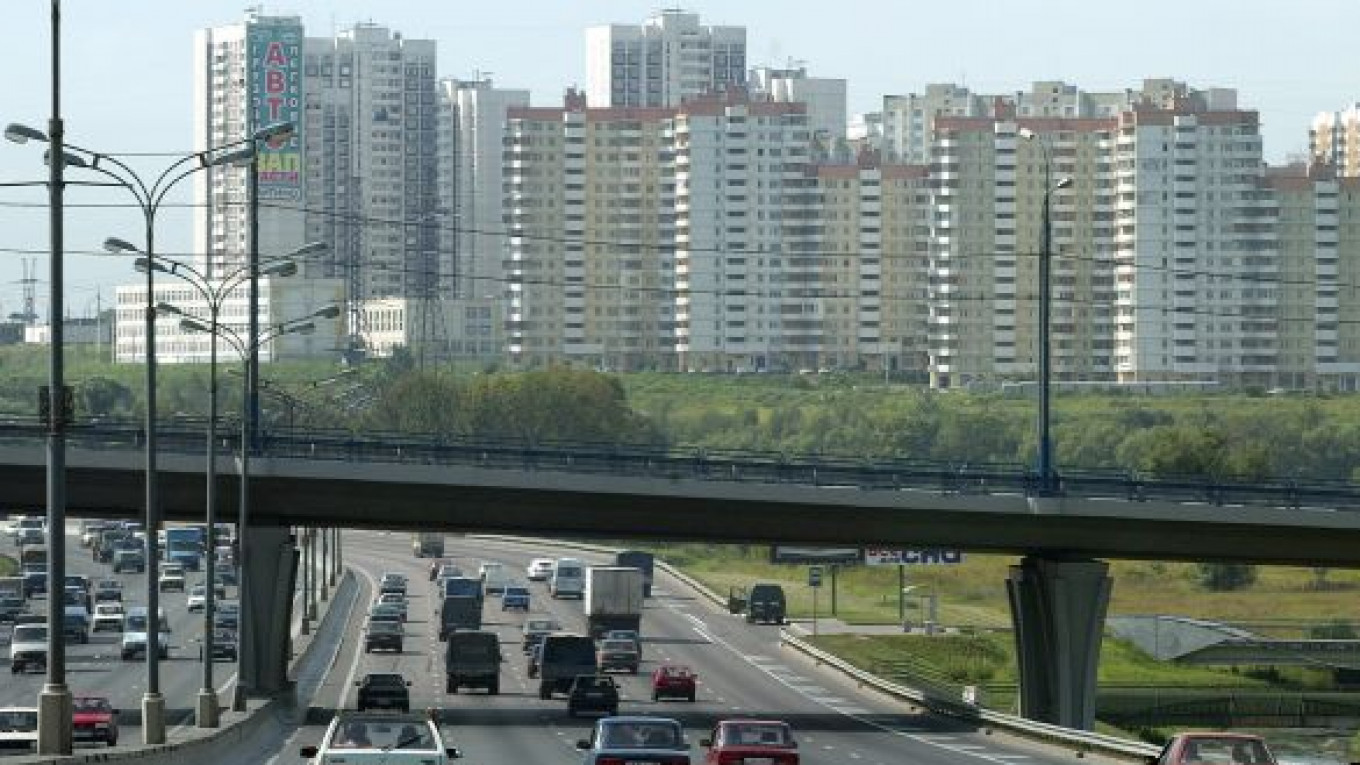Despite the economic downturn and project delays, Muscovites continue to buy apartments &mdash as long as they're inexpensive and can be purchased on installment or credit.
But developers are not meeting the demand on a large scale within the city limits, so new construction is shifting beyond the MKAD.
Construction time frames for half of all investment contracts that have already been signed in Moscow, both for residential real estate and commercial space (totaling 40 million square meters), are being breached, Mayor Sergei Sobyanin recently said.
There are now about 1,200 investment contracts to build housing in the capital with completion dates in 2010-15, according to calculations by the analytical department at Miel. Of those, about 830,000 square meters are frozen, while 10.8 million square meters are stuck at the planning stage.
The Western Administrative District has 236 projects &mdash more than any other part of the city &mdash where work on construction sites has been frozen. In the Fili-Davydkovo neighborhood alone, according to local officials, "a lack of financing" has halted reconstruction of several blocks for Mirax-Fili.
Other investment contracts have been extended, or in the case of SU-155's projects, are up for reconsideration by the Mayor's Office.
A special land and town-planning committee established by Sobyanin is taking stock of the current agreements with developers, which the builders hope will lower their costs for construction sites.
Currently, land costs are clearly inflated, one developer said. "We tried to buy plots in the capital, thinking we could get them cheaply. They were rattling off prices as if everyone was doing just fine" during the crisis, the developer said.
In early December, the average price per square meter of residential space in Moscow was 142,000 rubles ($4,590), compared with 115,000 rubles a year earlier, according to data from analytical portal IRN.ru. In Moscow, inexpensive apartments costing up to 100,000 rubles per square meter are the ones most often purchased.
NDV-Nedvizhimost, which primarily sells inexpensive housing, has found buyers in the first 11 months of the year for 550,000 square meters in new Moscow apartment buildings and 100,000 square meters in the city suburbs, chief executive Alexander Khrustalyov said.
In the first 10 months of 2010, Miel had 3,262 deals on the primary market, said Grigory Kulikov, the company's board chairman. By mid-2010, Miel-Novostroiki was selling 20,000 to 25,000 square meters per month in Moscow and the surrounding region, and the company expects a year-end figure of about 230,000 square meters, chief executive Maria Litinetskaya said. This year, for every new apartment sold in Moscow, the company has sold two in the suburbs, she said.
New development projects will most likely continue to follow demand into the Moscow region, according to developers polled by Vedomosti.
For example, this year SU-155 was working on construction of 745,600 square meters in the Moscow region and 200,900 square meters in the capital. Next year, SU-155 plans to build 870,600 square meters in the region and 149,400 square meters in Moscow, the company's press service said.
Mikhail Malikov, president of Avgur-Estate, said the developer had sold 34,000 square meters &mdash or half of all their apartments in new buildings &mdash in the first 11 months of the year in their Moscow region development Kommunarka.
"Last month, a square meter there cost 67,000 rubles. In the nearby Moscow districts of Tyoply Stan or Konkovo, a square meter starts at 100,000 to 120,000 rubles," Malikov said.
Krost chief executive Alexei Dobashin said the developer purchased land in the Moscow region town of Krasnogorsk &mdash just five kilometers from its Moscow development Welton Park. "The price per square meter is half as much [in the region], and the size of the apartments is also smaller. The savings are significant," he said.
Next year, according to forecasts by Miel-Novostroiki, developers will begin work on several projects of at least 1.5 million square meters apiece. Khrustalyov, of NDV-Nedvizhimost, said he thought that Moscow would also see some renewed attention from builders. "In the next two to three years, 10 million to 12 million square meters will hit the market," he said.
A Message from The Moscow Times:
Dear readers,
We are facing unprecedented challenges. Russia's Prosecutor General's Office has designated The Moscow Times as an "undesirable" organization, criminalizing our work and putting our staff at risk of prosecution. This follows our earlier unjust labeling as a "foreign agent."
These actions are direct attempts to silence independent journalism in Russia. The authorities claim our work "discredits the decisions of the Russian leadership." We see things differently: we strive to provide accurate, unbiased reporting on Russia.
We, the journalists of The Moscow Times, refuse to be silenced. But to continue our work, we need your help.
Your support, no matter how small, makes a world of difference. If you can, please support us monthly starting from just $2. It's quick to set up, and every contribution makes a significant impact.
By supporting The Moscow Times, you're defending open, independent journalism in the face of repression. Thank you for standing with us.
Remind me later.






